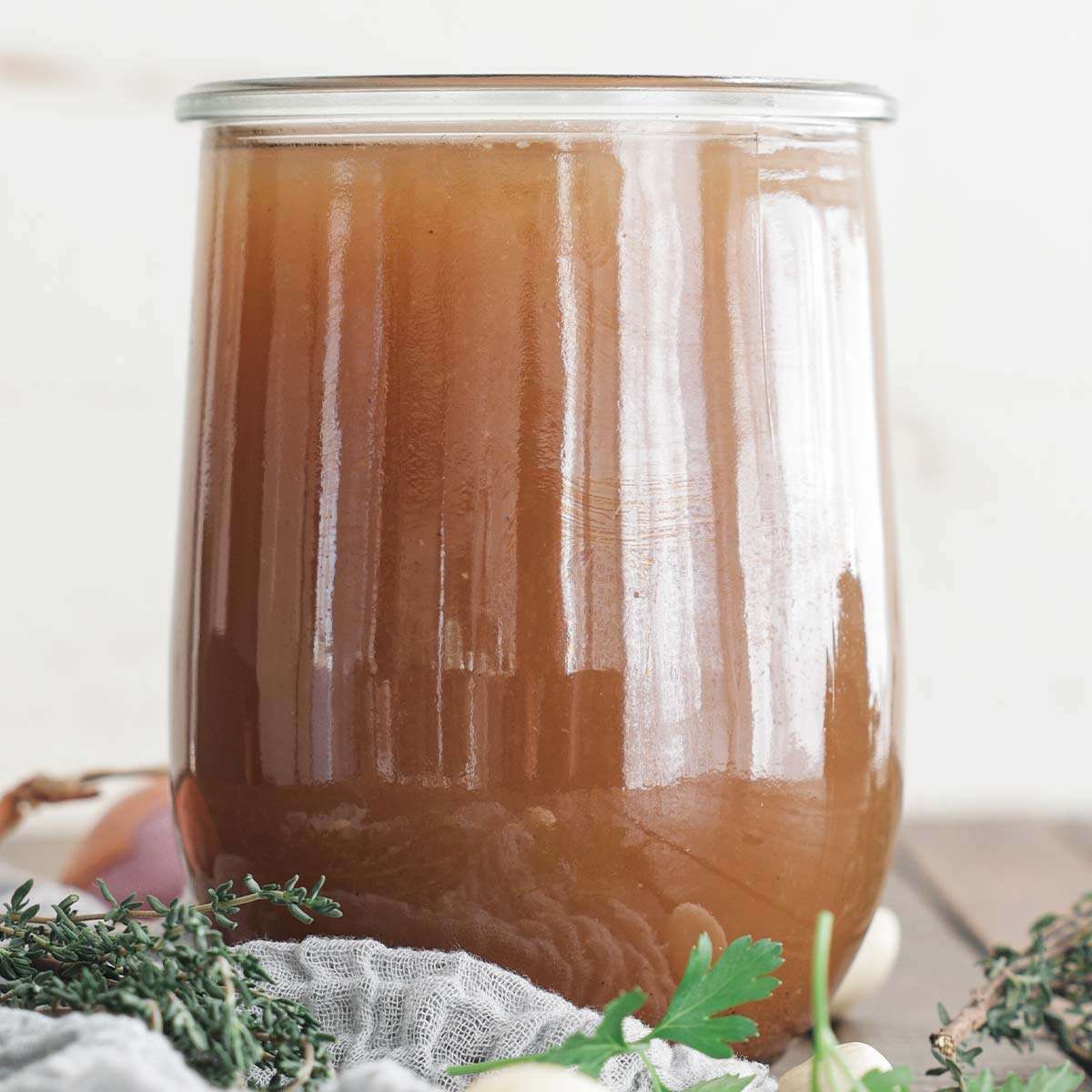
0.0 from 0 votes
How to Make a Remouillage
Learn how to make a remouillage of rewashing already used bones to make a delicious stock that can be used for soups, stews, or sauces.
Prep Time
10 mins
Cook Time
4 hrs
Servings: 2 gallons
Calories: 161 kcal
Course:
Condiments
Cuisine:
French
Ingredients
- 16 pounds of leftover cooked veal or beef bones
- 4 roughly chopped yellow onions weighing a total of 1 pound
- 4 roughly chopped ribs of celery weighing a total of 8 ounces
- 4 peeled or unpeeled roughly chopped carrots weight a total of 8 ounces
- 4 to 6 sprigs of thyme
- 4 to 6 parsley stems
- 15 to 18 peppercorns
- 3 to 4 garlic cloves
Instructions
- Once you’ve completely drained the stock, return the bones, cooked mirepoix, spices, and herbs in the pot and onto the cooktop.
- Completely cover the bones in 2 to 2 ½ gallons of cold water. The water should cover the bones by at least 2 inches, but no more than 4.
- Next, add in the onions, celery, carrots, thyme, parsley, peppercorns, and garlic. You can also place the spices and herbs on a 1 x 1 square foot piece of cheesecloth. Fold up the corners and securely tie a double knot around it using butcher’s twine to ensure nothing is coming out. As a note, if you plan on using a chinois to drain everything, you can just place everything in the cheesecloth into the pot.
- Simmer the stock of low to medium heat for 3 to 6 hours. The timing of this cook will depend on how much you cooked the initial stock for. If you cooked the first stock for 6 hours, you could cook the remouillage for up to 6. If you cooked the first stock for 8 hours plus, then you only will be able to get as much flavor from the remouillage as possible in 3 or so hours.
- Come back every hour to skim and discard any impurities or fat that collects at the top using a ladle.
- Strain the stock completely using a chinois, fine mesh strainer, or cheesecloth.
- Use it, or store in the fridge or freezer for a later date.
Cup of Yum
Notes
- A humble piece of advice for making my Remouillage recipe is to skim the top every hour while it simmers. It might seems like a minor detail, but it really helps keep the stock clean and the flavor pure.
- Make a small sauce: I like to use remouillage as a base for small sauces by building on it with other ingredients. For example, I start with veal stock, make espagnole, and then turn it into a rich demi-glace.
- Compost the bones: After I strain the stock, the bones are usually soft and broken down. I often add them to my garden compost to help enrich the soil.
- Cool it properly: After I strain the remouillage, I let it cool completely before storing it. This helps prevent condensation in containers and keeps the flavor fresh.
- Label and date: When I freeze remouillage, I always label and date the container. That way, I know exactly how long it’s been stored and what I’m working with.
- Make-Ahead: You can make this up to 2 days ahead. Store it according to the directions below.
- How to Store: Cool, cover, and keep the remouillage in a container for up to 5 days. This will freeze well in large or smaller containers for up to 6 months. Thaw it in the fridge for 1 day before reheating.
- How to Reheat: Add the desired amount of remouillage to a pot and heat over low to medium heat until warm.
Nutrition Information
Calories
161kcal
(8%)
Carbohydrates
37g
(12%)
Protein
5g
(10%)
Fat
1g
(2%)
Saturated Fat
0.2g
(1%)
Polyunsaturated Fat
0.3g
Monounsaturated Fat
0.1g
Sodium
159mg
(7%)
Potassium
971mg
(28%)
Fiber
9g
(36%)
Sugar
16g
(32%)
Vitamin A
21013IU
(420%)
Vitamin C
33mg
(37%)
Calcium
145mg
(15%)
Iron
2mg
(11%)
Nutrition Facts
Serving: 2gallons
Amount Per Serving
Calories 161
% Daily Value*
| Calories | 161kcal | 8% |
| Carbohydrates | 37g | 12% |
| Protein | 5g | 10% |
| Fat | 1g | 2% |
| Saturated Fat | 0.2g | 1% |
| Polyunsaturated Fat | 0.3g | 2% |
| Monounsaturated Fat | 0.1g | 1% |
| Sodium | 159mg | 7% |
| Potassium | 971mg | 21% |
| Fiber | 9g | 36% |
| Sugar | 16g | 32% |
| Vitamin A | 21013IU | 420% |
| Vitamin C | 33mg | 37% |
| Calcium | 145mg | 15% |
| Iron | 2mg | 11% |
* Percent Daily Values are based on a 2,000 calorie diet.